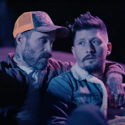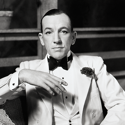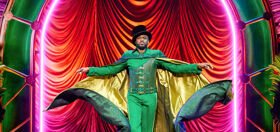
While it may sometimes seem like Queerty only cares about politicians, studs and celebrities (in that order), nothing could be further from the truth. In fact, we strive to include all members of the gay community, regardless of how ripped their abs are or elite their contacts. To that end, this is Average ‘Mo, where we introduce you to regular gays from around the world to discover what life is like in their neck of the woods.
Today, a reformed Southern Baptist discusses his faith and the dog-eat-dog L.A. fashion world.
Age: 25
QUEERTY: I’m from Arizona, too. How did you like growing up there?
How about we take this to the next level?
Our newsletter is like a refreshing cocktail (or mocktail) of LGBTQ+ entertainment and pop culture, served up with a side of eye-candy.
Tony Hicks: Well, I didn’t hate it, but it was interesting. I grew up with a lot of different people. When I was younger and in elementary and then junior high school, I grew up with more black and Latino kids. When I got older and moved to other side of the city and went into high school, I found myself with more of a Caucasian crowd. Growing up with a mixture of people taught me how people viewed African Americans and their attitudes about them—I learned how to “talk white” and not be “hood.” Stereotyping while growing up was something that, as an African American male, I dealt with daily, and being black and gay was a little harder to deal with as well.
Do you think people were more prejudiced against your race or your sexuality?
For my race. But only when I was in high school. When I was in college I hung out with everyone, had a white roommate. I think when I was growing up, though, my sexuality was always secondary to my ethnicity. You see my skin tone before you hear me speak, and that has always played a hand at the way people treated me back home and how the they treat me now.
In our pre-interview, you said you don’t know when you came out. Explain that.
I say that because I really never had to [come out]. Everyone around me already believed me to be gay and, though I would deny it when they asked me, I always knew I was. I kept my sexuality from a lot of people because, in my mind, I didn’t want everyone to be right about me. Even though in my heart of hearts I knew I was gay, I had the idea that maybe I would change and grow out of the phase. But apparently I never did.

Did you stay in Tucson for college?
Yes, I went to the University of Arizona.
What did you study?
When I first got into the school, I was in the business program. But in my first quarter of school – and pledging my fraternity – I realized that I didn’t want to be a businessman, I wanted to be an entertainer. I changed colleges and went into the theater program, which was the best decision I could have made for myself. I met great people and found myself not having to put on airs; I was able to really let loose. My parents, of course, weren’t the happiest, but they supported me.
How was it being gay and pledging a fraternity? Many people have this idea that frat guys are homophobic, drunk jerks.
It was cool. I never had to really worry about it. I had other brothers in my frat that were gay as well, but we never really brought it up. It wasn’t something that you wore on your sleeve and discussed on a daily basis, but I was respected and that’s all that I cared about.
How did you end up in California?
When I graduated in 2004, I had been accepted to the Fashion Institute of Design and Merchandising (FIDM) in Los Angeles, for manufacturing. I had originally applied so I could get out of Tucson, and it was the only way I saw myself being able to leave and not have to deal with my parents anymore. I graduated from FIDM in June of 2006. I loved my time there. It broke me into the fashion world and how fashion is really portrayed in L.A.
Speaking of your parents, you mentioned in the pre-interview that they are Southern Baptist. Was it difficult growing up in that environment?
Being raised Baptist wasn’t actually hard, to be honest. I had a strong faith as a child, and I was in the choir and was active in a lot of church activities. I was always going on a church trip and celebrating with people who loved and believed in God. But when it concerned my sexuality and my want to be with the same sex, it hurt. All the adults I was around always had their views on homosexuality, and it was in almost every sermon that was given on Sunday mornings. I started realizing that there are hypocrites everywhere within the church: gay ministers, swindlers, thieves, gossip queens and horny deacons. I became aware that my soul couldn’t be as damned as the adults I had grown up with and had looked up to. And I knew that God, no matter what, would forgive me at the end of the day.
Knowing how the religion feels about who you are, do you consider yourself a Baptist anymore?
Not so much anymore. I haven’t really practiced since I moved out [to Los Angeles]. I still go to church with my cousin, who is Lutheran, but as far as being a part of the church, I am not. It’s hard to be a part of something that hates you and condemns you to going to hell. But my faith in God is still strong and I know that there is a higher being.

Is the fashion industry in L.A. really as cutthroat and competitive as we think?
Yes. In L.A. it’s a little different than The Devil Wears Prada, though. People are out to make a name for themselves, but the reality is it’s hard as hell to get into the industry unless you know people or you are amazing as what you do. Also, they really focus more on your work experience than your education. I went to a top fashion school and I’m still at the bottom of the barrel in terms of experience and jobs that I’ve held. The thing out here in L.A. – and this is just my opinion – is that you have no one to depend on but yourself. Sometimes you have to fib a little bit to get what you want, or nag and bug someone until they give you a chance, because if you don’t, you’ll be stuck at entry level for a while.
Are you working in fashion now?
I’m currently not working since the economy – especially in Los Angeles – has gone to shit. But when I do work, I’m a stylist and a retail manager.
Are you the type of Angeleno who takes it easy in Venice or the type who rages in WeHo?
I love to go out and party. I know it sounds cliched, but L.A. is about going out, dressing nice, getting blitzed and doing it all over again the next day. I have found a really good set of people who I hang out and party with. Ive been here for five years almost and it doesn’t ever seem to die down. Living in L.A. has given me a confidence I didn’t really have when I lived back in Arizona. I’m more opinionated and I’m more of a realist then I ever was. L.A. gives you a tough shell.


















anon
I like this feature. Seems like a cool guy.
dbb
What Happned..sorry I don’t want pics with a headline..I want to read a big this format stinks and I probably wont be back…please think b4 you change. A headline and a pic that might or might not have something to do with the story isn’t why I read blogs….
J
@dbb: I draw you a tissue and you can cry yourself to sleep. Great article, really down to earth guy, can’t wait to see the next one.